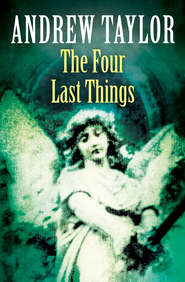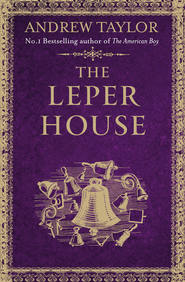По всем вопросам обращайтесь на: info@litportal.ru
(©) 2003-2024.
✖
The Fire Court: A gripping historical thriller from the bestselling author of The Ashes of London
Автор
Год написания книги
2018
Настройки чтения
Размер шрифта
Высота строк
Поля
‘He’ll only speak to you. I’m no use to him. You’re the one with the purse.’
Margaret whimpered softly. She set the pan on the fire.
‘Why didn’t he tell us sooner?’
‘He was taken up for debt that very afternoon. It’s only yesterday evening his mother raised the money to get him out of prison.’
Sam hopped down the passage and into the yard. I followed. Over his shoulder, I saw the crossing-sweeper sitting on the side of the trough that caught the rainwater. He was huddled in a filthy cloak with his hat drawn low over his ears. He was a crooked man with a sallow countenance.
When he saw us, he sprang up and executed a clumsy bow. Then he shrank back into his cloak as if he wanted to make himself as small as possible.
‘Sam says you saw my father on the day he died,’ I said. ‘As well as the day before, when you brought him back here.’
Barty nodded so violently that his hat fell off, exposing a bald patch covered in scabs, below which a fringe of greasy hair straggled towards his shoulders. He licked his lips. ‘You won’t make me go before a justice, master? Please, sir.’
‘Not if you tell me the truth.’
‘I done nothing wrong.’ He looked from me to Sam with the eyes of a dog that fears a beating.
‘Tell me,’ I said. ‘You won’t be the poorer for it.’
‘It was like Thursday, master. He came out of Clifford’s Inn again, down to Fleet Street. He was in a terrible hurry, and he knocked against a bookstall there, and the bookseller swore at him …’
Sam nudged him with his elbow. ‘Tell his honour the rest.’
Barty screwed up his face. ‘He was looking back over his shoulder. As if someone was chasing him.’
‘What?’ I snapped. ‘Who?’
‘Couldn’t see, sir. There was a wagon coming down from St Paul’s, and a coach coming the other way, under the Bar. But I thought I’d go over and give the old fellow a helping hand, like I done the other day.’
‘Hoping it would be worth your while,’ Sam said. ‘You don’t have to tell us all that. Go on.’
‘Well …’ Barty looked at me, and then away. ‘That’s when it happened. The old man tripped – fell into the road – in front of the wagon. But I heard …’
I seized his collar and dragged him towards me. Part of me wanted to shake the life out of him. ‘What did you hear?’
‘His screams, master. His screams.’
I let the wretch go. He fell back against the trough. I was trembling.
‘And next?’ I said.
‘All the traffic stopped. I went over the road to see if …’
‘If there were pickings to be had?’
He tried to give me an ingratiating smile. ‘He was alive still, sir. Just. There was a crowd around him. But he looked up and he saw me there among them. I swear he saw me, master, I swear he did. He knew me. I know he did. He said … Rook. Where’s the rook?’
‘Rook,’ I said. ‘Rook? What rook?’
Barty stared up at me. ‘I don’t know what he meant, master. But I know he was scared of something.’
‘What else?’ I demanded.
‘That’s all he said, master. Then he was gone.’
Later that morning there was a knocking at the door. Sam announced that the tailor had come to wait on me.
I had quite forgotten the appointment, perhaps because I did not want to remember it. Death is a dreary business, time-consuming and expensive, and so is its aftermath. But it would not be right in the eyes of the world if I went abroad without visible signs of my bereavement.
Some of these signs were cheap enough to arrange – before the funeral, I had ordered Margaret to dull the metal of my buckles, attach black silk weepers to my hatband, and blacken my best brown shoes – including the soles, on Margaret’s advice, for they would be visible when I knelt to pray.
I had borrowed a suit of mourning for the funeral but I needed to have my own. On Saturday, I had visited the tailor’s shop to be measured, and to choose the material and discuss the pattern. Now the man had come to fit the suit and to try to persuade me to buy a black silk sash to set off the new clothes.
By the time all this was done, my head was clearer, and my stomach had returned to something approaching normality, though the very thought of sack made me feel queasy.
Death has this consequence: it jerks a man from the rut of routine: it throws him back on his own company at a time when he wants it least. All this time, as the tailor prattled away and my mind became my own again, I could not concentrate on anything but the one word: ‘rook’. There was nothing to distract me from it.
But what could I do? Find the nearest justice and lay the information before him? What was there to say? That a foolish old man had strayed into Clifford’s Inn, and afterwards he had fallen under the wheels of a wagon in Fleet Street. A crossing-sweeper had told me that his last words had been to ask where the rook was.
What crime had been committed? Whom could I lay information against? But I had to do something, for my father’s sake.
No. That was a lie. I had to do something for my own sake as much as his. In the hope of easing the grief, the guilt.
When the tailor was gone, I took the tray of my father’s possessions upstairs to his chamber. The bed had already been stripped to its mattress and the curtains removed. The floor had been scrubbed and the room aired; Margaret was a vigorous housekeeper.
My father’s clothes, such as they were, lay folded in the press. His smell clung to them, faint and unsettling. An old man’s smell, musty and familiar. He had left little else behind him apart from his Bible and the contents of his pockets.
He had had the Bible as long as I could remember. It was a Geneva Bible, the old translation favoured by those of a Puritan persuasion. When he had been taken up for treason, he had had the book in prison with him and he read it over and over. When I was a child, he had ordered me never to touch it in case I sullied the sacred volume with the sinful touch of my grubby fingers. Until now, I had obeyed him.
Now the Bible was mine. I took it down to the parlour and laid it on the table, where the light fell on it from the window. I turned the pages, which were brittle and torn. Without my father there, the book had lost its significance. It was still a Bible, of course – the Holy Book, more precious than all the world. The Word of God. I did not dispute that. The volume was dense with wisdom, crammed with essence of holiness. But at the same time it was just a book, a small, shabby copy of something available in its tens of thousands across the country. It needed my father to lend it weight and value.
Fixed with a rusty pin to the back cover was a fold of paper. Inside, I found a lock of light brown hair, the strands twisted together and held in place with a knotted red thread.
Memory ambushed me, swift and vicious as a footpad. ‘Rachel … how graceful she is, James, even in her kitchen. Why, she is as graceful as a deer.’
I touched the curl of hair, the fragment of my mother, a relic of someone who had been alive, whom my father had once loved and desired. I could not imagine him courting her. I could not imagine my parents being young together, younger than I was. But it seemed that her youthful self had remained so vividly alive in his memory that the image of her had lured him into Clifford’s Inn, had lured him among the lawyers.
My father hated them. Lawyers were agents of Satan, servants of the Antichrist. They had helped to put him in prison. Yet desire for his dead wife had cast out all fear of them.
CHAPTER SIX (#ulink_3b2b73b3-a964-5f0b-a990-f1d2eed0bf88)
St Dunstan-in-the-West was partly clothed in scaffolding. The church projected into the street, forcing the roadway into a bottleneck before it passed under the Bar into the Strand. Shops and booths huddled as if for protection against the south aisle wall, blocking more of the pavement and constricting the foot traffic. Though the Fire had not destroyed the church, it had come close enough to cause minor damage and blacken the stonework, particularly at the east end.
The entrance to Clifford’s Inn lay at the west end of the nave, squeezed between the square tower of the church and the wall of the neighbouring building. I walked along a flagged passage that took me past the churchyard to a gate. A small, dingy courtyard lay beyond, much wider than it was deep, surrounded by a series of buildings of different sizes and ages.
The hall was directly opposite, filling the right-hand half of the northern range. I followed the path to the doorway at its left-hand end, where people were standing and talking in low voices. Some were lawyers and their clerks. Others were ordinary citizens, both men and women.











